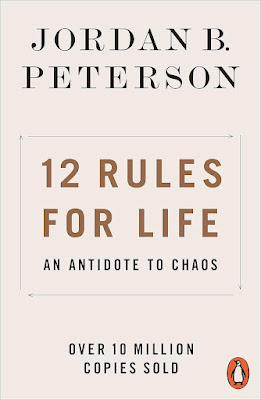12 Rules for Life: An Antidote to Chaos is a 2018 self-help book by the Canadian clinical psychologist Jordan Peterson. It provides life advice through essays in abstract ethical principles, psychology, mythology, religion, and personal anecdotes. The book topped bestseller lists in Canada, the United States, and the United Kingdom, and had sold over five million copies worldwide by the end of 2020.
Peterson's book is
a complex and ambitious work, and it is difficult to summarize its many
insights in a short space. However, here is a brief overview of the 12 rules:
Rule 1: Stand up straight with
your shoulders back
Peterson argues that good posture is a sign of strength and
confidence, and that it can have a positive impact on both your physical and
mental health. He also suggests that standing up straight can help you to take
on life's challenges with more courage and determination.
Rule 2: Treat yourself like
someone you are responsible for helping
Peterson believes that we should all strive to be the best
versions of ourselves, and that we should treat ourselves with kindness and
compassion. He argues that we should also take responsibility for our own
happiness and well-being, and that we should not rely on others to make us
happy.
Rule 3: Make friends with
people who want the best for you
Peterson argues that the people we spend time with have a
significant impact on our own happiness and success. He advises us to choose
friends who are supportive and encouraging, and who want us to succeed.
Rule 4: Compare yourself to who
you were yesterday, not to who someone else is today
Peterson believes that we should all strive to improve
ourselves, but that we should not compare ourselves to others. He argues that
we should focus on our own progress, and that we should celebrate our own
accomplishments, no matter how small they may seem.
Rule 5: Do not let your
children do anything that makes you dislike them
Peterson argues that parents should set clear expectations for
their children, and that they should enforce those expectations consistently.
He believes that it is important to discipline children in a way that is fair
and loving, but that it is also important to avoid letting children get away with
bad behavior.
Rule 6: Set your house in
perfect order before you criticize the world
Peterson argues that we should focus on fixing our own problems
before we try to fix the problems of the world. He believes that we should all
strive to be the best versions of ourselves, and that we should make our own
lives as good as possible.
Rule 7: Pursue what is
meaningful (not what is expedient)
Peterson argues that we should all strive to find something
meaningful in our lives. He believes that we should find a purpose that is
greater than ourselves, and that we should dedicate our lives to that purpose.
Rule 8: Tell the truth — or, at
least, don't lie
Peterson argues that honesty is essential for building trust and
maintaining healthy relationships. He believes that we should always strive to
tell the truth, even when it is difficult.
Rule 9: Assume that the person
you are listening to might know something you don't
Peterson argues that we should all be open to learning from
others. He believes that we should listen to others with an open mind, and that
we should be willing to admit when we are wrong.
Rule 10: Be precise in your
speech
Peterson argues that we should all strive to be clear and
concise in our communication. He believes that we should use language carefully
and accurately, and that we should avoid using vague or ambiguous language.
Rule 11: Do not bother children
when they are skateboarding
Peterson uses this rule as a metaphor for the importance of
allowing people to have their own individual interests and pursuits. He
believes that we should not interfere in the lives of others unless they are in
danger.
Rule 12: Pet a cat when you
encounter one on the street
Peterson uses this rule as a reminder to enjoy the simple
pleasures in life. He believes that we should all take some time each day to
appreciate the beauty of the world around us.
Peterson's book is not a quick fix for all of life's problems.
However, it does offer a thoughtful and insightful perspective on how to live a
meaningful and fulfilling life. Peterson's rules are not always easy to follow,
but they are all based on the principle of personal responsibility and
self-improvement.
In addition to the 12 rules, Peterson's book also
includes a number of other important insights.
For example, he discusses the importance of:
- Taking risks and stepping outside of your comfort zone. Peterson believes that it is important to challenge yourself and
to try new things. He argues that we should not be afraid of failure, and
that we should learn from our mistakes.
- Being grateful for what you have.
Peterson believes that it is important to appreciate the good things in
our lives, big or small. He argues that gratitude can help us to live
happier and more fulfilling lives.
- Living in the present moment.
Peterson believes that we should focus on the here and now, and that we
should avoid dwelling on the past or worrying about the future. He argues
that living in the present moment can help us to appreciate life more
fully.
Peterson's book is a complex and ambitious work, and it is difficult to
summarize its many insights in a short space. However, the 12 rules and the
other insights discussed above provide a good overview of Peterson's philosophy
on life.
Here are some additional insights from Peterson's book:
- On the
importance of meaning: "Meaning is the antidote to chaos. It is what
stabilizes us and gives us direction."
- On the
importance of truth: "Truth is the foundation of trust. It is what
allows us to build relationships and to work together."
- On the
importance of responsibility: "We are all responsible for our own
lives. We cannot blame others for our problems or our failures."
- On the
importance of courage: "Courage is the willingness to face our fears
and to do what is right, even when it is difficult."
Conclusion
Jordan Peterson's 12 Rules for Life is a complex and ambitious
work that offers a thoughtful and insightful perspective on how to live a
meaningful and fulfilling life. Peterson's rules are not always easy to follow,
but they are all based on the principle of personal responsibility and
self-improvement.
In the conclusion of his book, Peterson argues that the most
important thing is to find something meaningful in your life and to dedicate
yourself to that purpose. He also emphasizes the importance of living in the
present moment, being grateful for what you have, and taking risks.
Peterson's book is not a quick fix for all of life's problems.
However, it does offer a valuable framework for thinking about life and for
making choices that will lead to a more fulfilling and meaningful existence.






0 Comments